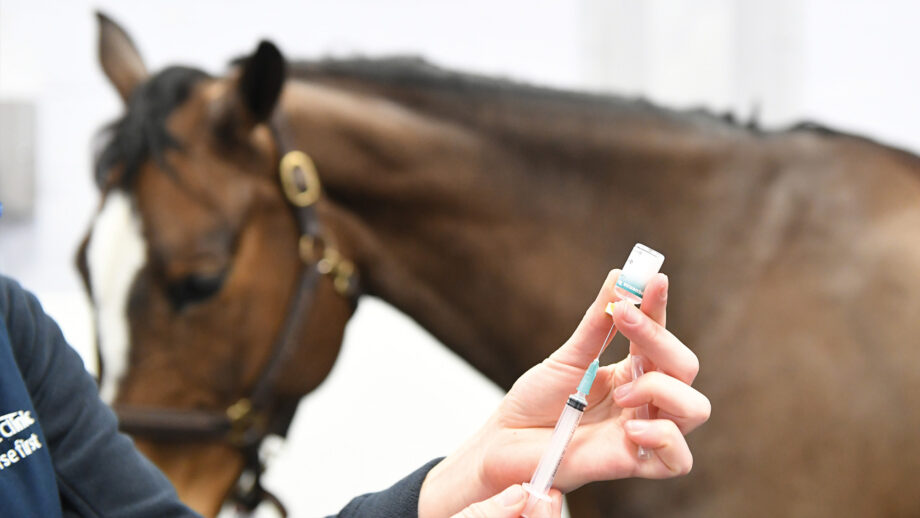The situation is relating to the EHV-1 outbreak in Europe is improving but far from over. H&H speaks to authorities, riders and vets to find out the latest, and what is being done to protect UK horses
IMPROVEMENTS have been reported in Valencia, Spain, but the equine herpes virus (EHV-1) outbreak is “not yet fully under control” – as horses develop neurological signs at a second Spanish venue, and protocols are introduced for horses returning to the UK.
In the rapidly changing situation surrounding the outbreak, on 6 March the FEI athlete representative in Valencia reported that the medical condition of the horses there remains “stable”.
{"content":"PHA+4oCcV2hpbGUgdGhlc2Ugd2VyZSBwb3NpdGl2ZSBzaWducywgdGhlIHZldGVyaW5hcnkgdGVhbSBzdHJlc3NlZCBpdCBpcyBpbXBvcnRhbnQgdG8gYmUgYXdhcmUgdGhhdCB0aGUgZGlzZWFzZSB3YXMgbm90IHlldCBmdWxseSB1bmRlciBjb250cm9sLOKAnSBzYWlkIGFuIEZFSSBzcG9rZXNtYW4uPC9wPgo8cD5Dcml0aWNpc21zIGhhdmUgYmVlbiBtYWRlIHRoYXQgYXV0aG9yaXRpZXMgaGFkIG5vdCBwcm92aWRlZCBzdWl0YWJsZSBzdGFibGluZywgbW9yZSBob3JzZXMgaGFkIGRpZWQgdGhhbiBoYWQgYmVlbiByZXBvcnRlZCBhbmQgdGhlcmUgd2VyZSBub3QgZW5vdWdoIHZldHMgb24gc2l0ZS48L3A+CjxwPlRoZSBGRUkgcmVwb3J0ZWQgb24gMyBNYXJjaCB0aGF0IGl0cyB2ZXRlcmluYXJ5IG1hbmFnZXIgaGFkIG9yZ2FuaXNlZCBhIG1lZXRpbmcgaW4gVmFsZW5jaWEgYmV0d2VlbiB0aGUgU3BhbmlzaCBtaW5pc3RyeSwgb3JnYW5pc2VycywgdmV0cywgdGhlIEZFSSBhdGhsZXRlIHJlcHJlc2VudGF0aXZlIGFuZCB0aGUgRkVJIHRlYW0gbGVhZGVyIHRvIGhlbHAg4oCccmVzb2x2ZSBpc3N1ZXPigJ0sIGFuZCBhZ3JlZW1lbnQgd2FzIHJlYWNoZWQgb24gcm9sZXMgYW5kIHRyZWF0bWVudCBwcm90b2NvbHMuIFRoZSBGRUkgc2FpZCBzb21lIGFkZGl0aW9uYWwgdGVtcG9yYXJ5IHN0YWJsaW5nIGRlbGl2ZXJlZCB3YXMg4oCcbm90IHVwIHRvIHN0YW5kYXJk4oCdIGFuZCDigJx1bnN1aXRhYmxlIGZvciBsYXJnZXIgaG9yc2Vz4oCdIHNvIHJlcGxhY2VtZW50cyB3ZXJlIG9yZ2FuaXNlZC48L3A+CjxwPjxkaXYgY2xhc3M9ImFkLWNvbnRhaW5lciBhZC1jb250YWluZXItLW1vYmlsZSI+PGRpdiBpZD0icG9zdC1pbmxpbmUtMiIgY2xhc3M9ImlwYy1hZHZlcnQiPjwvZGl2PjwvZGl2PjxzZWN0aW9uIGlkPSJlbWJlZF9jb2RlLTMxIiBjbGFzcz0iaGlkZGVuLW1kIGhpZGRlbi1sZyBzLWNvbnRhaW5lciBzdGlja3ktYW5jaG9yIGhpZGUtd2lkZ2V0LXRpdGxlIHdpZGdldF9lbWJlZF9jb2RlIHByZW1pdW1faW5saW5lXzIiPjxzZWN0aW9uIGNsYXNzPSJzLWNvbnRhaW5lciBsaXN0aW5nLS1zaW5nbGUgbGlzdGluZy0tc2luZ2xlLXNoYXJldGhyb3VnaCBpbWFnZS1hc3BlY3QtbGFuZHNjYXBlIGRlZmF1bHQgc2hhcmV0aHJvdWdoLWFkIHNoYXJldGhyb3VnaC1hZC1oaWRkZW4iPg0KICA8ZGl2IGNsYXNzPSJzLWNvbnRhaW5lcl9faW5uZXIiPg0KICAgIDx1bD4NCiAgICAgIDxsaSBpZD0ibmF0aXZlLWNvbnRlbnQtbW9iaWxlIiBjbGFzcz0ibGlzdGluZy1pdGVtIj4NCiAgICAgIDwvbGk+DQogICAgPC91bD4NCiAgPC9kaXY+DQo8L3NlY3Rpb24+PC9zZWN0aW9uPjwvcD4KPHA+T24gNCBNYXJjaCB0aGUgRkVJIGp1bXBpbmcgZGlyZWN0b3IgYXJyaXZlZCBpbiBWYWxlbmNpYSBhbmQgaGVsZCBhIG1lZXRpbmcgd2l0aCBvcmdhbmlzZXJzOyBhIGZvbGxvdy11cCB3YXMgb3JnYW5pc2VkIHRvIOKAnGVuc3VyZSBsaW5lcyBvZiBjb21tdW5pY2F0aW9uIHJlbWFpbmVkIG9wZW7igJ0uIE9uIDUgTWFyY2ggdGhlIEZFSSBhdGhsZXRlIHJlcHJlc2VudGF0aXZlIHJlcG9ydGVkIHRvIHRoZSBGRUkgdmV0ZXJpbmFyeSBkaXJlY3RvcnkgdGhhdCBzdXBwbGllcyB3ZXJlIGNvbnRpbnVpbmcgdG8gYmUgZGVsaXZlcmVkIHRvIHRoZSB2ZW51ZS48L3A+CjxwPk9uIDYgTWFyY2ggdGhlIEZFSSBjb25maXJtZWQgc3VwcG9ydCBhdmFpbGFibGUgZm9yIHRob3NlIGluIFZhbGVuY2lhIGluY2x1ZGVkIGV4dHJhIGdyb29tcyBiZWluZyBtYWRlIGF2YWlsYWJsZSBhbmQgYWRkaXRpb25hbCBkcml2ZXJzIGJlaW5nIHNvdWdodCB0byBoZWxwIHRyYW5zcG9ydCBob3JzZXMgaG9tZS4gVGhlIEZFSSBzYWlkIHN0YWJsaW5nIGhhZCBhcnJpdmVkLCBhIEZyZW5jaCB0ZWFtIHNwZWNpYWxpc2VkIGluIGludGVybmF0aW9uYWwgcXVhcmFudGluZSBzdGFibGVzIGhhZCBiZWVuIHByb3ZpZGluZyByZWNvbW1lbmRhdGlvbnMgb24gYmlvc2VjdXJpdHksIGFuZCB0aGUgRnJlbmNoIHRlYW0gaGFkIHByb3ZpZGVkIGFuIG9uIHNpdGUgbGFiIHRvIGhlbHAgd2l0aCBtb25pdG9yaW5nLjwvcD4KPHA+T24gOCBNYXJjaCB0aGUgRkVJIHJlcG9ydGVkIDEwIGhvcnNlcyBoYWQgZGllZCBzaW5jZSB0aGUgb3V0YnJlYWsgYmVnYW47IHR3byBvbiBzaXRlIGFuZCB0aHJlZSBpbiBob3NwaXRhbCBpbiBWYWxlbmNpYSwgdHdvIGluIEJhcmNlbG9uYSBhbmQgdHdvIGluIEdlcm1hbnkuIFRoZSBzcG9rZXNtYW4gc2FpZCBoaWdoZXIgbnVtYmVycyBoYWQgYmVlbiBzdGF0ZWQgb24gc29jaWFsIG1lZGlhIGJ1dCBuaW5lIHdhcyB0aGUg4oCcb2ZmaWNpYWzigJ0gZmlndXJlLjwvcD4KPGRpdiBjbGFzcz0iYWQtY29udGFpbmVyIGFkLWNvbnRhaW5lci0tbW9iaWxlIj48ZGl2IGlkPSJwb3N0LWlubGluZS0zIiBjbGFzcz0iaXBjLWFkdmVydCI+PC9kaXY+PC9kaXY+CjxwPkJyaXRpc2ggcmlkZXIgQW5kcmV3IFNhZXRoZXJzLCB3aG9zZSBmb3VyIGhvcnNlcyBpbiBWYWxlbmNpYSBoYWQgaGFkIGEgZmV2ZXIsIHR3byBvZiB3aGljaCBhbHNvIGhhZCBuZXVyb2xvZ2ljYWwgc2lnbnMsIHRvbGQgPGVtPkgmYW1wO0g8L2VtPiBpdCBoYWQgYmVlbiDigJxhIGhhcmQgZmV3IHdlZWtz4oCdIGJ1dCB0aGluZ3Mgc2VlbWVkIHRvIGJlIOKAnGxldmVsbGluZyBvZmbigJ0uPC9wPgo8cD7igJxJIGZlZWwgbGlrZSBJ4oCZbSB3aW5uaW5nIHRoZSBiYXR0bGUgb2Ygc2F2aW5nIG15IGhvcnNlcywgYW5kIEkgY2Fu4oCZdCB3YWl0IHRvIGdldCBob21lIGJ1dCBJIGhhdmUgbm8gaWRlYSB3aGVuIHRoYXQgd2lsbCBiZSzigJ0gaGUgc2FpZC48L3A+CjxkaXYgY2xhc3M9ImFkLWNvbnRhaW5lciBhZC1jb250YWluZXItLW1vYmlsZSI+PGRpdiBpZD0icG9zdC1pbmxpbmUtNCIgY2xhc3M9ImlwYy1hZHZlcnQiPjwvZGl2PjwvZGl2Pgo8cD5PbiA0IE1hcmNoIGEgaG9yc2UgYXQgdGhlIDxhIGhyZWY9Imh0dHBzOi8vd3d3LmhvcnNlYW5kaG91bmQuY28udWsvdGFnL3NwYW5pc2gtc3Vuc2hpbmUtdG91ciI+U3Vuc2hpbmUgVG91cjwvYT4gaW4gVmVqZXIgZGUgbGEgRnJvbnRlcmEgZGV2ZWxvcGVkIG5ldXJvbG9naWNhbCBzaWducyBvZiBFSFYtMSwgYnV0IGhhZCByZXBvcnRlZGx5IHRlc3RlZCBuZWdhdGl2ZSB0byB0aGUgZGlzZWFzZS4gVGhlIGhvcnNlIGhhZCBiZWVuIGluIGlzb2xhdGlvbiB0d28ga2lsb21ldHJlcyBmcm9tIHRoZSBjb21wZXRpdGlvbiBzaW5jZSAyNiBGZWJydWFyeS48L3A+CjxwPkZvbGxvd2luZyBhIOKAnGZ1bGwgcmlzayBhbmFseXNpc+KAnSBjb25kdWN0ZWQgYnkgdGhlIFNwYW5pc2ggbWluaXN0cnksIG9uIDQgTWFyY2gsIHRoZSBzaG93IG9yZ2FuaXNlcnMgYW5kIHRoZSBGRUksIGl0IHdhcyBhZ3JlZWQgdGhlIGNvbXBldGl0aW9uLCBvcmlnaW5hbGx5IHNjaGVkdWxlZCB0byBydW4gdW50aWwgMjggTWFyY2gsIGNvdWxkIGNvbnRpbnVlIHVudGlsIDcgTWFyY2guIEJ1dCBvbiA1IE1hcmNoIHRoZSBGRUkgc2FpZCB0aGVyZSB3YXMg4oCcbm8gY2hvaWNl4oCdIGJ1dCB0byBpbW1lZGlhdGVseTxhIGhyZWY9Imh0dHBzOi8vd3d3LmhvcnNlYW5kaG91bmQuY28udWsvbmV3cy9zdW5zaGluZS10b3VyLWNhbmNlbGxlZC1laHYtbmV1cm9sb2dpY2FsLXNpZ25zLW5lZ2F0aXZlLXRlc3QtNzM5MjkwIj4gc2h1dCBkb3duIHRoZSBjb21wZXRpdGlvbjwvYT4gYWZ0ZXIgYSBzZWNvbmQgaG9yc2UgZGV2ZWxvcGVkIG5ldXJvbG9naWNhbCBzaWducy48L3A+CjxkaXYgY2xhc3M9ImFkLWNvbnRhaW5lciBhZC1jb250YWluZXItLW1vYmlsZSI+PGRpdiBpZD0icG9zdC1pbmxpbmUtNSIgY2xhc3M9ImlwYy1hZHZlcnQiPjwvZGl2PjwvZGl2Pgo8cD5PbiA3IE1hcmNoIHRoZSBGRUkgY29udGludWVkIHRvIGZvbGxvdyB1cCBvbiB0aGUgY29uZGl0aW9uIGFuZCB2ZXRlcmluYXJ5IGNhcmUgb2YgdGhlIHR3byBob3JzZXMgYW5kIGhhZCByZXF1ZXN0ZWQgYW4gdXBkYXRlIGZyb20gdGhlIHByaW1hcnkgdmV0ZXJpbmFyeSBkZWxlZ2F0ZSBvbiB0aGUgcmVtYWluaW5nIGhvcnNlcyBhdCB0aGUgdmVudWUuPC9wPgo8cD5UbyBkYXRlLCBlaWdodCBjb3VudHJpZXMgaGF2ZSBjb25maXJtZWQgRUhWLTEgY2FzZXM7IFNwYWluLCBCZWxnaXVtLCBGcmFuY2UsIEdlcm1hbnksIEl0YWx5LCBTd2VkZW4sIFN3aXR6ZXJsYW5kLCBhbmQgUWF0YXIuIEEgY2FzZSBpbiB0aGUgVVNBIHdhcyBub3QgbGlua2VkIHRvIHRoZSBFdXJvcGVhbiBvdXRicmVhay4gVW5kZXIgRkVJIHJlZ3VsYXRpb25zIDc1MiBob3JzZXMgdGhhdCBoYWQgYmVlbiBpbiBWYWxlbmNpYSBzaW5jZSAxIEZlYnJ1YXJ5IGFyZSBibG9ja2VkIGluIHRoZSBGRUkgZGF0YWJhc2UgdW50aWwgdGhleSBoYXZlIGZ1bGZpbGxlZCBuZWNlc3NhcnkgdGVzdGluZyByZXF1aXJlbWVudHMuPC9wPgo8cD5JbiBEb2hhLCB3aGVyZSB0aGUgR2xvYmFsIENoYW1waW9ucyBUb3VyIHdhcyB0YWtpbmcgcGxhY2UgKDTigJM2IE1hcmNoKSwgZm91ciBob3JzZXMgaGFkIGFycml2ZWQgZnJvbSBWYWxlbmNpYSBvbiAyMCBGZWJydWFyeSDigJMgb25lIG9mIHdoaWNoIHRlc3RlZCBwb3NpdGl2ZSBmb3IgRUhWLTEsIGhhdmluZyBiZWVuIGtlcHQgaW4gaXNvbGF0aW9uIHNpbmNlIGl0cyBhcnJpdmFsLiBBbGwgZm91ciBob3JzZXMgd2lsbCByZW1haW4gaW4gaXNvbGF0aW9uIHVudGlsIDE1IE1hcmNoLjwvcD4KPHA+QnJpdGlzaCBTaG93anVtcGluZyAoQlMpIGFuZCBCcml0aXNoIEV2ZW50aW5nIChCRSkgYW5ub3VuY2VkIGFsbCBob3JzZXMgcmV0dXJuaW5nIGZyb20gRnJhbmNlLCBTcGFpbiwgUG9ydHVnYWwsIEJlbGdpdW0sIEl0YWx5LCBBdXN0cmlhLCBQb2xhbmQsIHRoZSBOZXRoZXJsYW5kcywgR2VybWFueSwgYW5kIFNsb3Zha2lhIGZyb20gMSBNYXJjaCBzaG91bGQgYmUgaXNvbGF0ZWQgZnJvbSBob3JzZXMgd2hpY2ggbWF5IGF0dGVuZCBCUyBvciBCRSBjb21wZXRpdGlvbnMgYW5kIHRyYWluaW5nIGFuZCBhdHRlbmRlZCB0byBieSBzZXBhcmF0ZSBzdGFmZi4gSXQgaXMg4oCcc3Ryb25nbHkgYWR2aXNlZOKAnSBob3JzZXMgcmV0dXJuaW5nIGFyZSBzZXBhcmF0ZWQgZnJvbSBhbGwgb3RoZXIgaG9yc2VzLiBUaGUgc2FtZSBhcHBsaWVzIHRvIGhvcnNlcyB3aG8gaGF2ZSB0cmFuc2l0ZWQgdGhyb3VnaCB0aGVzZSBjb3VudHJpZXMgb24gdGhlaXIgcmV0dXJuLiBCcml0aXNoIEVxdWVzdHJpYW4gdG9sZCA8ZW0+SCZhbXA7SDwvZW0+IGVhY2ggQkVGIG1lbWJlciBib2R5IGhhcyBhZG9wdGVkIDxhIGhyZWY9Imh0dHBzOi8vd3d3LmhvcnNlYW5kaG91bmQuY28udWsvbmV3cy9laHYtYnJpdGlzaC1zaG93anVtcGVycy1tdXN0LWlzb2xhdGUtb24tcmV0dXJuLWZyb20tZXVyb3BlLTczOTAwNyI+dGhlc2UgcHJvdG9jb2xzLjwvYT48L3A+CjxwPkFsbCBob3JzZXMgb24gdGhlIHByZW1pc2VzLCBpbmNsdWRpbmcgdGhvc2Ugd2hvIGhhdmUgbm90IHRyYXZlbGxlZCB0byBFdXJvcGUsIG11c3QgaGF2ZSBtb25pdG9yaW5nIGFuZCB0d2ljZS1kYWlseSB0ZW1wZXJhdHVyZSByZWNvcmRpbmcuIFRoZXkgd2lsbCBiZSBleGNsdWRlZCBmcm9tIHBhcnRpY2lwYXRpb24gaW4gYWxsIEJFRiBtZW1iZXIgYm9keSBjb21wZXRpdGlvbnMgYW5kIGFjdGl2aXRpZXMgdW50aWwgdGhleSBoYXZlIGJlZW4gZnJlZSBvZiBjbGluaWNhbCBzaWducyBmb3IgMjggZGF5cywgb3IgYXBwcm9wcmlhdGUgdGVzdGluZyBhbmQgc2FtcGxlcyBoYXZlIGJlZW4gYXBwcm92ZWQgYnkgUm9zc2RhbGVzIExhYm9yYXRvcnkuPC9wPgo8ZGl2IGNsYXNzPSJpbmplY3Rpb24iPjwvZGl2Pgo8cD5EYXZpZCBSZW5kbGUsIGNoYWlyIG9mIHRoZSBCcml0aXNoIEVxdWluZSBWZXRlcmluYXJ5IEFzc29jaWF0aW9u4oCZcyAoQkVWQSkgaGVhbHRoIGFuZCBtZWRpY2luZXMgY29tbWl0dGVlIHRvbGQgPGVtPkgmYW1wO0g8L2VtPiBCRVZBIGhhZCBiZWVuIHdvcmtpbmcgd2l0aCBCRUYgdG8gcHJvdmlkZSBndWlkZWxpbmVzLCBhbmQgdGhlIG9yZ2FuaXNhdGlvbiDigJxjYW5ub3Qgc3RyZXNzIGhvdyBpbXBvcnRhbnQgaXQgaXPigJ0gZ3VpZGVsaW5lcyBhcmUgZm9sbG93ZWQuPC9wPgo8cD7igJxJZiBwZW9wbGUgZm9sbG93IHRoZSBndWlkZWxpbmVzIHRoZW4gRUhWIHdpbGwgYmUgY29udGFpbmVkOyBpZiB0aGV5IGRvIG5vdCwgbW9yZSBob3JzZXMgbWF5IGRpZSwgdGhlIGNob2ljZSBpcyBzdGFyayBhbmQgc2ltcGxlLOKAnSBoZSBzYWlkLjwvcD4KPHA+Cg=="}
You may also be interested in…
“A lot of people are panicking; we’ve been told to stay put but people are trying to get out anyway”
Library image.
“This episode serves as a reminder of the importance of biosecurity, vaccination and having plans in place for protecting horses
Library image.
Credit: Alamy Stock Photo
In an update today (1 March) the FEI confirmed four horses had died from the neurological form of EHV-1 in
Credit: Peter Nixon
Stay in touch with all the news in the run-up to and throughout the major shows and events during 2026 and beyond with a Horse & Hound subscription. Subscribe today for all you need to know ahead of these major events, plus online reports on the action as it happens from our expert team of reporters and in-depth analysis in our special commemorative magazines. Have a subscription already? Set up your unlimited website access now
H&H senior news writer
Since joining H&H in 2018, Becky has covered a broad range of equestrian news including welfare matters, veterinary studies, FEI Tribunal hearings and road safety campaigns. She has also interviewed top riders including Scott Brash, John Whitaker and Ian Stark, to name just a few. Becky’s reporting has taken her to Canada for Spruce Meadows and France for Pau five-star, as well as the Royal Highland and Blair Castle International Horse Trials closer to home. She was also a key part of the remote reporting team for the Tokyo Olympics and the Europeans.






